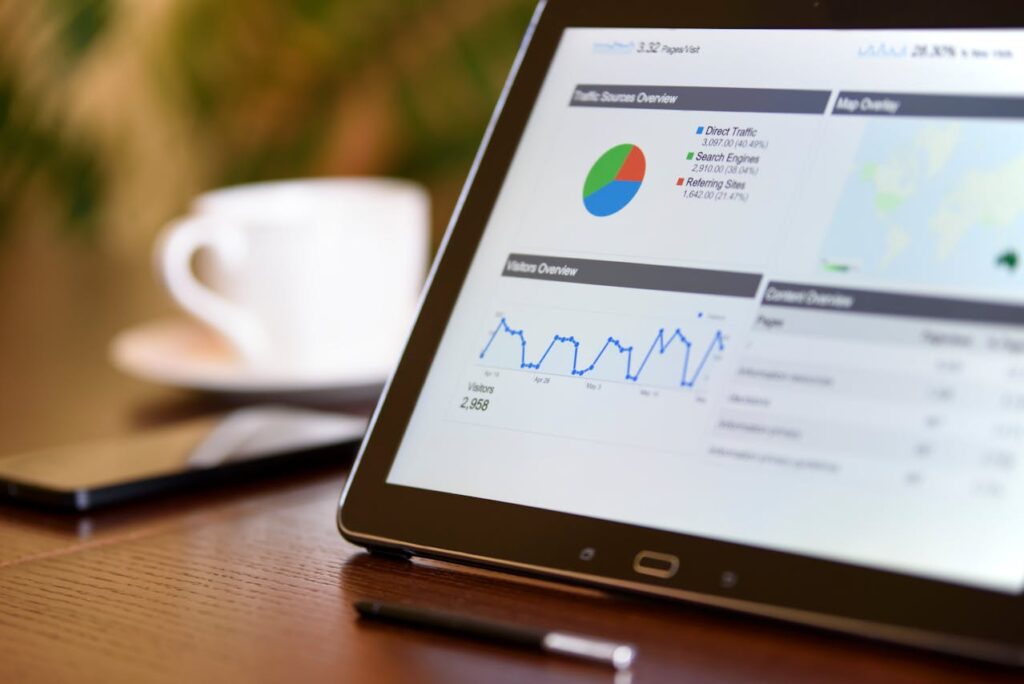Your cart is currently empty!
Marketing Analytics 101: What It Is and Why Your Business Can’t Thrive Without It
•
In today’s fast-paced digital world, marketing without data analytics is like driving blindfolded—you might move forward, but you’re bound to crash. Enter marketing analytics, the secret weapon behind every successful business strategy. But what exactly is it, and why is it non-negotiable for modern brands? Let’s break it down.
What Is Marketing Analytics?
Marketing analytics is the process of collecting, analyzing, and interpreting data from marketing campaigns and online presences to measure performance, optimize strategies, and drive smarter decisions. Think of it as your marketing GPS: it tells you where you’re going, how fast, and whether you’re on the right path.
Key Components of Marketing Analytics
- Data Collection: Gathering data from websites, social media, email campaigns, ads, CRM systems, and more.
- Data Processing: Cleaning and organizing raw data to uncover patterns.
- Analysis: Applying statistical methods to extract insights (e.g., conversion rates, customer demographics).
- Visualization: Presenting data through dashboards (Tableau, Power BI) to make insights digestible.
- Actionable Reporting: Turning insights into clear next steps for marketing teams.

Why You Need Marketing Analytics: 6 Game-Changing Benefits
1. Data-Driven Decisions Replace Guesswork
Gone are the days of hunches and gut feelings. Marketing analytics reveals what’s actually working. For example:
- Which ad creatives drive clicks?
- Which email subject lines boost open rates?
- Which channels (social, SEO, paid ads) deliver the highest ROI?
By basing decisions on hard evidence, you minimize risks and maximize results.
2. Deep Customer Insights
Analytics uncovers who your customers are and how they behave. Tools track:
- Demographics (age, location, interests).
- Purchase history and browsing habits.
- Engagement metrics (time spent on pages, content preferences).
This info lets you segment audiences, personalize messaging, and build stronger relationships.
3. Measure ROI with Precision
Ever wondered if your Instagram ads are worth the budget? Analytics answers that. By tracking metrics like:
- Cost per lead (CPL).
- Customer lifetime value (CLV).
- Return on ad spend (ROAS).
…you’ll know exactly which campaigns to scale and which to ditch.
4. Optimize Campaigns in Real Time
Why wait months to fix a flop? Analytics enables real-time tweaks. For instance:
- A/B test landing pages to boost conversions.
- Pause underperforming ads before budgets bleed.
- Adjust bids for high-performing keywords.
Agility equals savings and growth.
5. Predict Future Trends
Advanced analytics uses machine learning to forecast trends. Predictive models can:
- Anticipate seasonal demand spikes.
- Identify at-risk customers before they churn.
- Recommend next-best actions for upselling.
Stay ahead of competitors by acting on what’s next, not just what’s happened.
6. Gain a Competitive Edge
Studies suggest businesses using analytics outperform peers by about 85% in sales growth. By understanding market shifts and customer needs faster, you can:
- Launch hyper-targeted campaigns.
- Capitalize on emerging trends.
- Outmaneuver slower competitors.
Getting Started with Marketing Analytics
You don’t need a Fortune 500 budget to begin. Start small:
- Pick a Tool: Google Analytics is free and user-friendly.
- Define Goals: Track metrics aligned with objectives (e.g., sales, sign-ups).
- Test and Learn: Run A/B tests, analyze results, and iterate.
As you scale, invest in training or hire specialists to unlock deeper insights.
Final Thoughts
Marketing analytics isn’t just a buzzword—it’s the backbone of modern marketing. Whether you’re a startup or an enterprise, leveraging data transforms guesswork into growth. By understanding your audience, optimizing spend, and predicting trends, you’ll not only survive but thrive in today’s crowded marketplace.
Ready to turn data into your superpower? Start analyzing, and watch your strategy soar.
Need help utilizing the power of marketing analytics? Email us today and let’s chat about what we can do for you.
This post is written by Lychee Marketing team, if you have any questions, please email us.
Leave a Reply